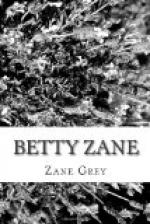* * * * * * * * * * * * * * * *
Myeerah was the Indian name for a rare and beautiful bird—the white crane—commonly called by the Indians, Walk-in-the-Water. It had been the name of Tarhe’s mother and grandmother. The present Myeerah was the daughter of a French woman, who had been taken captive at a very early age, adopted into the Huron tribe, and married to Tarhe. The only child of this union was Myeerah. She grew to be beautiful woman and was known in Detroit and the Canadian forts as Tarhe’s white daughter. The old chief often visited the towns along the lake shore, and so proud was he of Myeerah that he always had her accompany him. White men travelled far to look at the Indian beauty. Many French soldiers wooed her in vain. Once, while Tarhe was in Detroit, a noted French family tried in every way to get possession of Myeerah.
The head of this family believed he saw in Myeerah the child of his long lost daughter. Tarhe hurried away from the city and never returned to the white settlement.
Myeerah was only five years old at the time of the capture of the Zane brothers and it was at this early age that she formed the attachment for Isaac Zane which clung to her all her life. She was seven when the men came from Detroit to ransom the brothers, and she showed such grief when she learned that Isaac was to be returned to his people that Tarhe refused to accept any ransom for Isaac. As Myeerah grew older her childish fancy for the white boy deepened into an intense love.
But while this love tendered her inexorable to Isaac on the question of giving him his freedom, it undoubtedly saved his life as well as the lives of other white prisoners, on more than one occasion.
To the white captives who fell into the hands of the Hurons, she was kind and merciful; many of the wounded she had tended with her own hands, and many poor wretches she had saved from the gauntlet and the stake. When her efforts to persuade her father to save any one were unavailing she would retire in sorrow to her lodge and remain there.
Her infatuation for the White Eagle, the Huron name for Isaac, was an old story; it was known to all the tribes and had long ceased to be questioned. At first some of the Delawares and the Shawnee braves, who had failed to win Myeerah’s love, had openly scorned her for her love for the pale face. The Wyandot warriors to a man worshipped her; they would have marched straight into the jaws of death at her command; they resented the insults which had been cast on their princess, and they had wiped them out in blood: now none dared taunt her.
In the spring following Isaac’s recapture a very serious accident befell him. He had become expert in the Indian game of ball, which is a game resembling the Canadian lacrosse, and from which, in fact, it had been adopted. Goals were placed at both ends of a level plain. Each party of Indians chose a goal which they endeavored to defend and at the same time would try to carry the ball over their opponent’s line.




